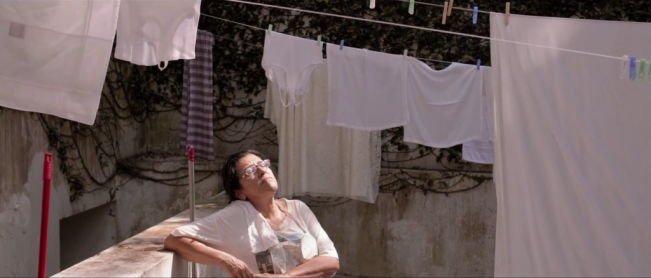

By Kim Voynar Voynar@moviecitynews.com
Sundance 2015 Review: The Second Mother
Directed by Anna Muylaert and written by Muylaert with the film’s star Regina Casé collaborating, The Second Mother examines Brazil’s complicated maze of class and social rules through the lens of Val (Casé), who works for the stylish and elegant “Dona Barbara” (Karine Teles) and Barbara’s meek husband Carlos (Lourenceo Mutarelli) caring for the couple’s son Fabinho (Michel Joelsas). Val is like a second mother to Fabinho, who’s now a teen on the verge of young manhood but still likes to snuggle with Val as he did when he was little; likewise Fabinho has become a second child to Val, a substitute for her own daughter, left behind 13 years ago with relatives so Val could support her by taking this job.
The arrival of Val’s willful, bright teenage daughter, Jessica (Camila Márdila) shifts the social power dynamic in the house, rattling the comfortable foundation of Val’s good-natured acceptance of her place within the structure of Brazilian society to its very core. Val is conventional, never questioning the seemingly endless, intricate rules that dictate place on the social ladder: Who can eat ice cream? Who can sleep in the guest room? Who can swim in the pool? Jessica, who’s come to Sao Paulo to study architecture, is bold, curious, and burns with intelligence, ambition, and a stubborn determination to refuse to accept being treated as a second-class citizen.
The intelligent, sometimes biting social commentary woven throughout the film is somewhat reminiscent of Lucretia Martel’s 2008 Cannes entry The Headless Woman, but where that film relied on ethereal cinematography and wove its social commentary enigmatically and almost abstractly, The Second Mother tackles similar issues of class division and human dignity primarily through humor and studies in contrast: Val’s unquestioning acceptance of the social construct versus her smart, modern daughter’s questioning of “the way things are.” The way Val nurtures and coddles Fabinho, while she scolds and harangues Jessica. The seeming meekness of Carlos, who reveals his own hidden streak of stubbornness by quietly asserting his place as head of the household, inviting Jessica – to Val and Barbara’s mutual horror – to sleep in the guest room, eat lunch at the family table, and eat Fabinho’s special chocolate ice cream with almonds.
What makes The Second Mother particularly compelling is that the Muylaert doesn’t particularly judge or take sides with her characters, even as she criticizes the social construct within which she places them. We may see Barbara as insensitive and solipsistic, or Val as blissfully naive, but the excellent script and wonderfully nuanced performances reveal Val and Barbara not as a mere props to agitate for or against, but as a relatable women. As the film progresses we see both the fragility and fierceness of motherhood through both Barbara’s confident career woman and Val’s stalwart servant.
Strip away social ladders and money, and the societal constructs that divide these two mothers whose lives have become entwined through the son they “share” quietly slip away like the vapor that such things truly are; we come to see these women not as employer and employee, served and servant, but simply as two women who love their children and struggle with the sacrifices they make to support them. It’s the social system that creates the class divide that Muylaert critiques through her storytelling, not these two women who are merely acting out the roles in which society has cast them. The Second Mother tackles what could be a dour subject matter with humor and grace rather than melodramatics or agitprop. Societal constructs may not change easily, but it’s ultimately up to each person to decide how – or whether – to live constrained by such things.















Anna Muylaert is the Jane Austen of the 21st century! I almost didn’t see this film because all the reviewers made it sound like class warfare. It is not, it is a brilliant comedy of manners. It finally arrived in Washington, DC in October 2015. This review is right on!